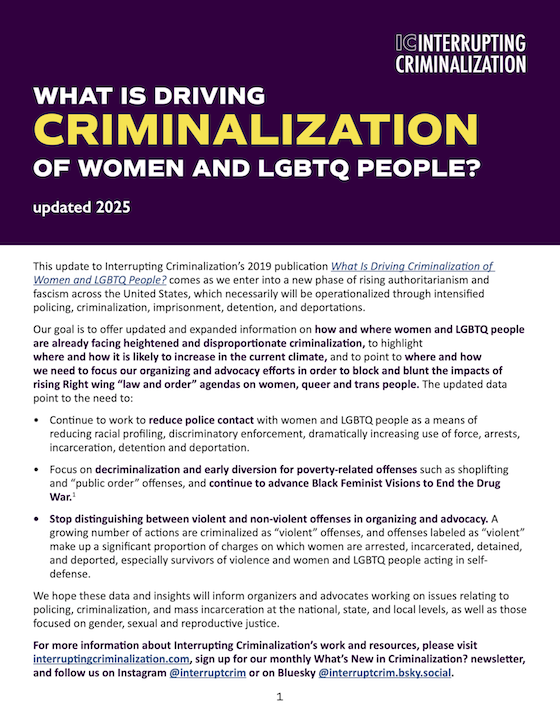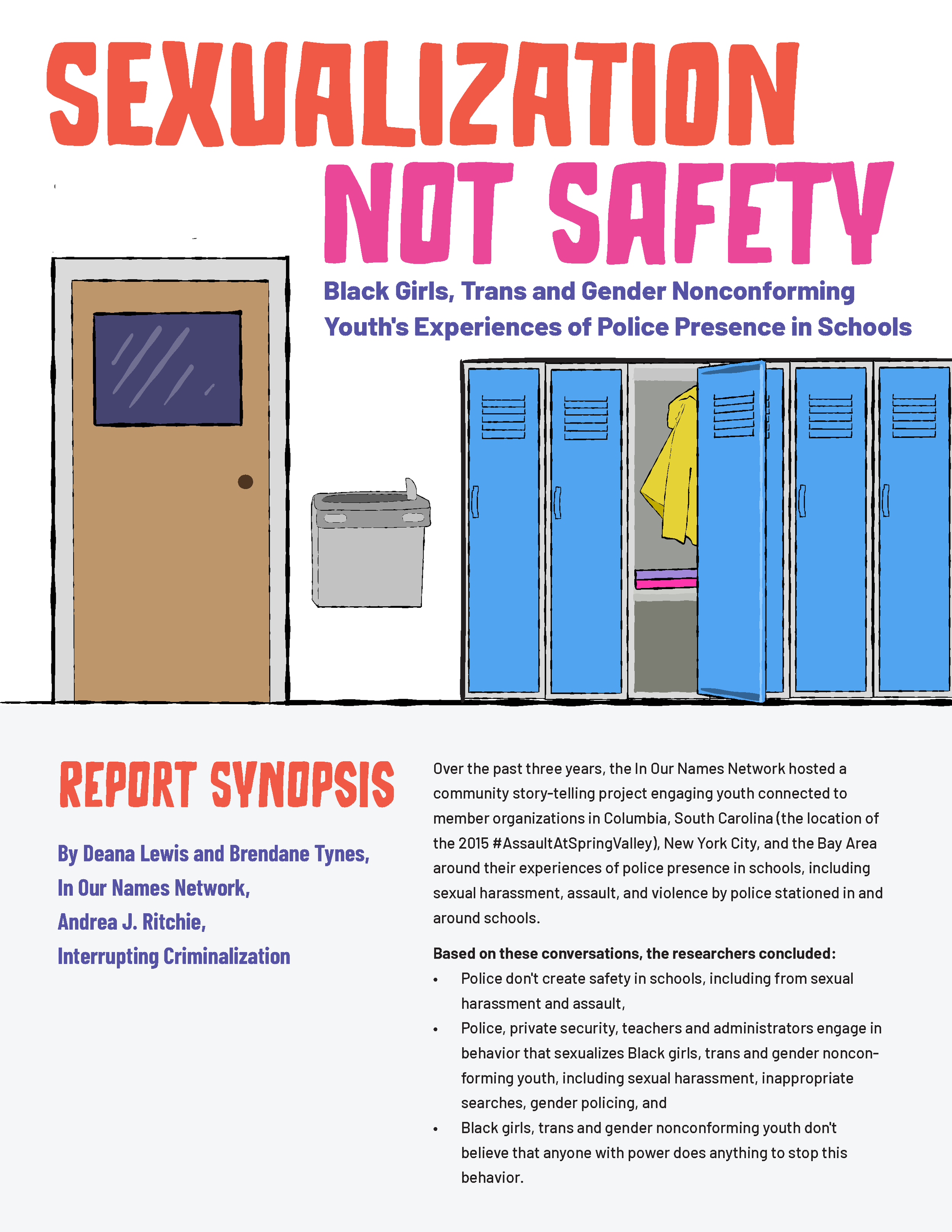Diversion Derailed
A report by the National Black Women’s Justice Institute and Interrupting Criminalization that examines diversion programs from the perspective of the people they impact the most — participants themselves — and offers recommendations for program evaluation and creation of community-based programs that genuinely divert people from the criminal punishment system toward sustainable well-being.
What Is Driving Criminalization of Women and LGBTQ People? Update
This update to Interrupting Criminalization’s 2019 publication What Is Driving Criminalization of Women and LGBTQ People? comes as we enter into a new phase of rising authoritarianism and fascism across the United States, which necessarily will be operationalized through intensified policing, criminalization, imprisonment, detention, and deportations.
Building Black Feminist Visions to End the Drug War: Report
A report summarizing the impacts of the global drug war on Black women, girls, and trans and gender nonconforming people, as well as the Black feminist visions, analysis, and needs articulated during the Building Black Feminist Visions to End the Drug War convening hosted by Interrupting Criminalization, the Drug Policy Alliance, and In Our Names Network in June 2023.
Reformist Reforms vs. Abolitionist Steps to End the Drug War
Chart breaking down the difference between reformist reforms which continue or expand the reach of the drug war, and abolitionist steps that work to chip away and reduce its overall impact. Originally from the report, Building Black Feminist Visions to End the Drug War.
Sexualization Not Safety: Black Girls, Trans, and Gender Nonconforming Youth’s Experiences of Police Presence in Schools: Report
A report sharing insights from a 3-year community story-telling project engaging Black girls, trans and GNC youth around their experiences of police presence in schools, including sexual harassment, assault, and violence.
5 Years of Interrupting Criminalization: Quilting Black Feminist Resistance
Challenging, interrupting, and building a world beyond criminalization is the unifying thread of IC’s work — and of the infrastructure and resources we are creating to support organizers on the ground across the country. Learn more in this summary of IC’s first five years of work.
Don’t Be A Copagandist: Police Sexual Violence Edition
A resource for journalists covering the issue of sexual violence by law enforcement agents, including police, school “resource” officers, school “safety” officers, private security stationed in schools, probation, parole, and immigration authorities, and Customs and Border Patrol.
Building Black Feminist Visions to End the Drug War: Summary
A resource summarizing key information from the Building Black Feminist Visions to End the Drug War convening, which took place in June 2023, bringing together dozens of Black feminist leaders and allies from 6 countries to explore the possibilities for a shared Black feminist vision and plan of action toward a world that centers bodily autonomy and self-determination in all forms.
Sexualization Not Safety: Black Girls, Trans, and Gender Nonconforming Youth’s Experiences of Police Presence in Schools: Report Synopsis
A report synopsis of a 3-year community story-telling project engaging youth in Columbia, S.C., New York City, and the Bay Area around their experiences of police presence in schools, including sexual harassment, assault, and violence by police stationed in and around schools.
Building Black Feminist Visions to End the Drug War Graphic Notes
Illustrated graphic notes from the Building Black Feminist Visions to End the Drug War virtual convening, hosted by Interrupting Criminalization, the Drug Policy Alliance, and the In Our Names Network on June 6-7, 2023.
Beyond Do No Harm
Thirteen principles for supporting people’s agency, self-determination, dignity of risk, and general wellbeing.
We Must Fight In Solidarity With Trans Youth
This brief is intended to help organizers working to stop the violence of surveillance, policing, and punishment and advance racial, reproductive, gender, LGBTQ, migrant, and disability justice.
Abortion Decriminalization is Part of the Larger Struggle Against Policing and Criminalization
This brief offers an analysis of how our movements are connected, and how to push back against a widening web of criminalization.
Cop’s Don’t Stop Violence
Combating Narratives Used to Defend Police Instead of Defunding Them
Breaking the Silence
This is a curriculum for sexual assault service providers intended to accompany Interrupting Criminalization’s report Shrouded in Silence: Police Sexual Violence - What We Know and What We Can Do About It. Facilitators and participants are strongly encouraged to review the report before using any of the exercises in this curriculum.
Shrouded in Silence
This report, in conjunction with an accompanying curriculum for sexual assault service providers, is intended to contribute to breaking this silence, to summarize what we know about sexual violence by law enforcement officers, and to offer concrete steps toward prevention of police sexual violence and increased safety, support, and opportunities for healing for survivors.
Police Responses to Domestic Violence: A Fact Sheet
Defunding police is a survivor-led anti-violence strategy that stops police from looting resources survivors need to prevent, avoid, escape and heal from violence - and puts more money into violence prevention and interruption.
6 Ds Until She’s Free
A resource intended to inform policymakers, organizations, advocates, and philanthropy entering the field as a result of growing awareness of rising and disproportionate rates of incarceration of women, girls, trans and gender nonconforming people. People incarcerated in women’s prisons now represent the fastest growing prison populations, increasing by 700% over four decades, outpacing the rate of growth of people in men’s prisons by 50%.
Trans Women of Color at Work
In this moment of uprising in response to the multiple crises unfolding across the country and world—particularly police violence against black people—it is imperative that we continue to demand what keeps our communities safe. Trans women and femmes of color (TWOC) have been historically excluded from the formal 1 workforce and forced to rely on criminalized work for survival. Such economic violence leads to police targeting and incarceration. Organizing over the past five years has begun to open up economic opportunities for trans women and femmes of color. We won’t go back. This is the time to fight to maintain and surpass those gains.
What is Driving Criminalization of Women & LGBTQ People?
Many people now know that women are the fastest growing prison and jail populations. Here’s a helpful factsheet on how we can Interrupt the Criminalization of Women, Trans and Gender Nonconforming People.



















